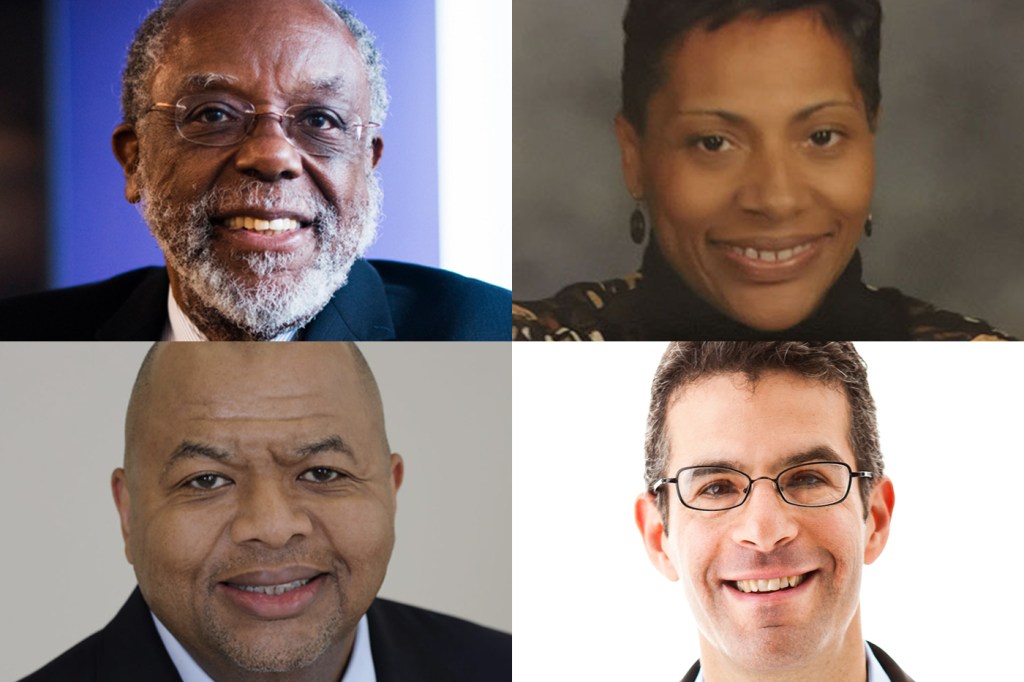‘These burdens shouldn’t be laid just at our doorstep’

The Black Lives Matter movement has shown no signs of receding over the four weeks since protests erupted around the world in response to the killings of George Floyd and other Black people. Which is promising: The hard work of confronting systemic racism and effecting meaningful change requires universal support, as three Black leaders at Northeastern noted in recognition of Juneteenth, the holiday of American emancipation from slavery.
“I am very proud of the mobilization and the energy that I’ve seen particularly from young people,” Rod Brunson, Thomas P. O’Neill Professor of Public Life at Northeastern, said Friday during the online panel discussion, Juneteenth: Legacies and Lessons. “We need to have some real substantive, concrete change. Otherwise we’re going to find ourselves right back to where we are today.”
Melissa Pearson, an assistant teaching professor of English at Northeastern, addressed the conflicted history of Juneteenth, which signifies the date—June 19, 1865, more than two years after the signing of the Emancipation Proclamation—when Union soldiers informed Black people in Galveston, Texas, that they were no longer enslaved.
Pearson described the Emancipation Proclamation as a “limp document” that didn’t carry weight until soldiers from the North arrived to enforce it.
“You had these recalcitrant Southern states that did not relinquish their power right away,” Pearson said. “They were concerned about their economy, and enslavement was their economy. And so they took every moment that they could to delay.”
Brunson said the two-year lag “represents an early and ongoing unwillingness of America to take their knees off Black people’s necks.”
Their fellow panelist, Ted Landsmark, Distinguished Professor of Public Policy and Urban Affairs at Northeastern, agreed that President Abraham Lincoln’s defining achievement was “a gift that couldn’t be delivered on.”
Juneteenth has gone unrecognized by the federal government and is a public holiday in only three states. Despite the efforts to ignore its meaning, Landsmark noted that Juneteenth has become a day of empowerment for Black people in the U.S.
“What Juneteenth does is to place the celebration of freedom in an African American context,” Landsmark said. “It is a holiday that is ours, as opposed to something that is being given to us.”
Pearson suggested that the ability to effect change at the grass-roots level will be crucial to the movement.
“Unlearning hate is not like a conversion experience,” Pearson said. “You’re not going to just be baptized into it and wake up the next day and you’re just free of all of that. But we lighten such load when we take in more information, and we learn how to use the right language, and the right action.”
The panelists agreed that continuing to connect white people to the movement will be crucial to its success. Landsmark pointed out that initiatives announced recently by Joseph E. Aoun, president of the university, are meant to hold the entire Northeastern community accountable for opposing racism and building a constructive society.
“Those of us who have been called upon to, in effect, represent our race, have to be patient and open-minded, because some people are having those kinds of conversations [for the] first time,” Landsmark said. “Increasingly, we’ve found that we have to share very uncomfortable experiences that we’ve had in a largely white world. That comes with the territory. But we’re not going to get to a point of reconciliation unless and until both sides are open to listening to what the others say, and more importantly, feel.”
Pearson noted that the removal of Confederate statues and other symbols derived from slavery should not imply that the hard anti-racism work has been accomplished. Landsmark suggested that some of those monuments should be left standing in Northern states, in order to reinforce the role of slavery in the development of the U.S.
“I frankly am opposed to removing certain of those symbols that permit us to continue to be in a state of denial about our complicity with Southern slaveholders,” Landsmark said. “I think that we need to use some of those symbols at least as educational moments—as reminders of how we think we could get away with sustaining a slave culture and white supremacy.”
Pearson emphasized that Black people cannot be asked to do all of the “heavy lifting” or to console white people over their guilt. She said that financial reparations for Black people, in return for centuries of unpaid labor that helped build the U.S. economy, will be necessary to help close the economic gap.
“These burdens shouldn’t be laid just at our doorstep,” Brunson said of the movement for equality. “There is a longstanding and ugly truth in this society that we’re expected to make everyone else feel good and feel comfortable, which is its own form of racism. It is very important that we recognize those unfortunate and uncomfortable truths, and not to add to that by relying on your Black colleagues and friends to fix a problem that certainly we don’t have the capacity to fix.”
“Nor that you created,” added Daniel Medwed, University Distinguished Professor of Law and Criminal Justice at Northeastern, who moderated the event.
Landsmark implied that the 2020 presidential election will be crucial to the movement, though he didn’t mention President Donald Trump by name.
“It is an embarrassment that after eight years of an African American president, and now three years of a white president, we see that we have slid backwards in terms of many of the metrics that really matter to our communities of color,” Landsmark said. “So now is the time for us to set some metrics and strategies for achieving social justice.
“It’s also clear that it takes leadership from Washington—and from the administration that has been in place there for long enough to have fueled a lot of divisiveness across the country—to really start to bring people back together around race, health, education, and a number of other issues that we have slid back on over the last few years. And so we need to have a moral and ethical commitment to reuniting the country, and a lot of that has to start within the context of our political leadership.”
For media inquiries, please contact media@northeastern.edu.






